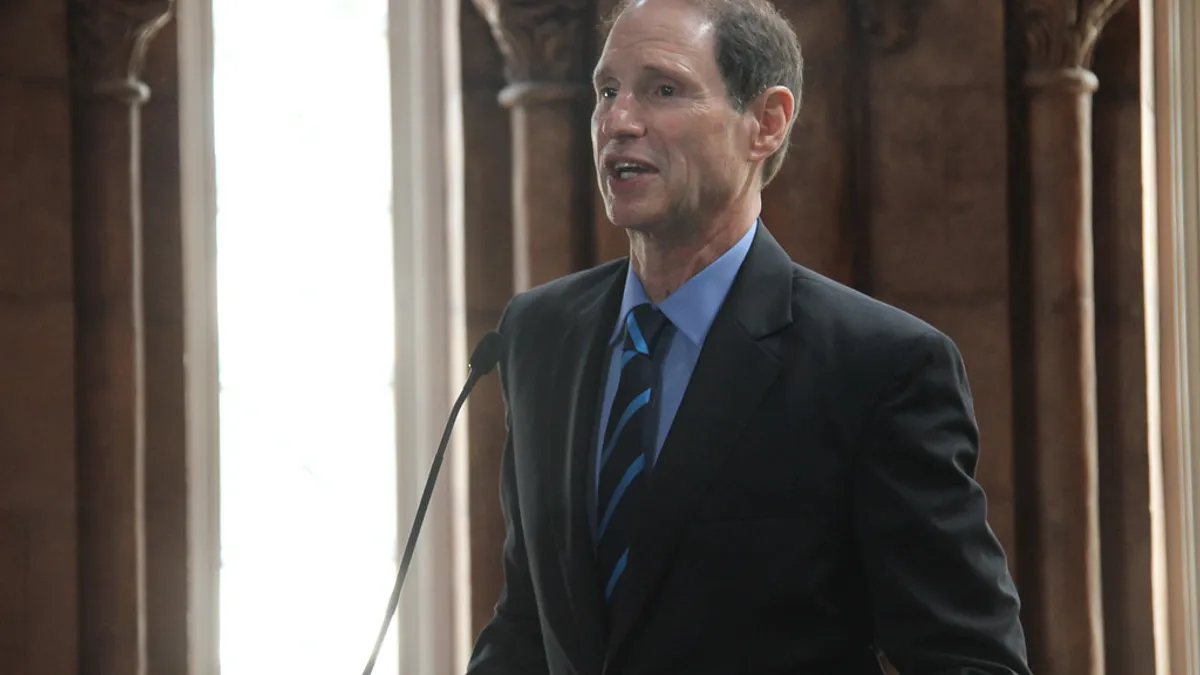Dive Brief:
- Members of the Senate Finance Committee vied on Wednesday to add and preserve resource-specific tax credits to the Clean Energy for America Act, a bill intended to replace some 40 individual tax incentives with broader and more uniform tax credits tied to carbon emissions reductions.
- Committee Chairman Ron Wyden, D-Ore., announced that he planned to place the Clean Energy for America Act directly onto the Senate calendar without further committee hearings after a vote on the amended bill ended in a tie split along party lines.
- Democratic members of the committee generally supported the bill, arguing that it would allow renewable energy and fossil fuels to compete in a free-market system, and would reduce carbon emissions. Republicans rejected the final version, saying what started as an effort to level the playing field between energy resources ultimately ended up as a bill that would promote renewable energy at the expense of fossil fuels.
Dive Insight:
Despite starting with bipartisan support for reforming the convoluted U.S. system of energy tax credits, a Wednesday meeting of the Senate Finance Committee ended with a sharply partisan divide over how best to accomplish that goal.
"This is an important time, and we're going to put America in the driver's seat of our new clean energy future," Sen. Debbie Stabenow, D-Mich., said in her opening remarks to the committee. She related that Henry Ford originally wanted to develop battery-powered vehicles, but couldn't achieve the necessary range before Congress approved incentives for oil and gas production. "We picked a winner and they won, a hundred years ago. Now we're trying to level the playing field."
But exactly what it means to level the playing field between renewable energy and fossil fuels quickly became a matter of debate, with Sen. Steve Daines, R-Mont., complaining that the committee's Democratic members had "plodded forward" with a bill that purported to create a resource-agnostic tax policy, while eliminating tax credits for fossil fuel production and extending credits for renewable resources.
The Clean Energy for America Act replaces several clean energy tax credits with a broader production tax credit worth 2.5 cents per kWh electricity produced. Any generation facility is theoretically eligible as long as it meets certain emissions reduction and labor requirements. The bill would extend existing clean energy production tax credits through the end of 2022, replacing those tax credits in 2023. It also creates a 30% investment tax credit for grid improvements and for businesses and homeowners who make energy efficiency upgrades, and tax credits worth up to $12,500 for clean fuels and electric vehicles.
However, Sen. Chuck Grassley, R-Iowa, noted that amendments made prior to Wednesday's meeting had already added three resource-specific tax credits into the bill.
"We started with a single neutral clean fuels credit," he said. "I now count three credits. At this rate, we will be back to 40 separate credits."
The committee proceeded to vote down nearly a dozen amendments, including proposals to maintain tax credits on oil, gas and critical minerals production, to maintain caps on EV tax credits and implement taxes on EV charging stations, and to delay the implementation of the bill until the average permitting time for new clean energy projects falls below three years. Two amendments — one which excludes EVs made in China from qualifying for EV tax credits, and another that enables joint rulemaking between the IRS and other federal agencies to determine eligibility requirements for the tax credits — were added to the bill with unanimous approval.
The committee also discussed, but did not vote on, adding specific tax credits to support the operation of existing nuclear and hydroelectric facilities.
The vote on final approval for the bill was split, 14-14, along party lines, but Sen. Wyden indicated he planned to place the bill directly on the Senate calendar without additional committee review, drawing criticism from Sen. John Cornyn, R-Texas.
"The chairman keeps talking about the free market. This bill is anything but a free market bill. It provides $31 billion for EVs and punishes fossil fuels," Cornyn said. "I believe in being civil, but I don't agree that this is a good faith bill. This is an ideological jihad against the status quo."














